The Vietnamese Spring Celebration, or Tet, is Vietnam’s most cherished festival. Laden with ancestral values and philosophies, it marks the end of a seasonal cycle and heralds a new beginning, symbolizing profound traditions passed down through generations. Tet, the paramount holiday, holds immense cultural significance and is deeply revered by all.
See more: The Best Time to Travel to Vietnam
Contents
Explore the Tet Culture
The Vietnamese Spring Festival, commonly referred to as Tet, invites you on a captivating journey into the heart of Vietnamese culture. This unique experience allows visitors to intimately discover the nation’s rich traditions and vibrant customs.
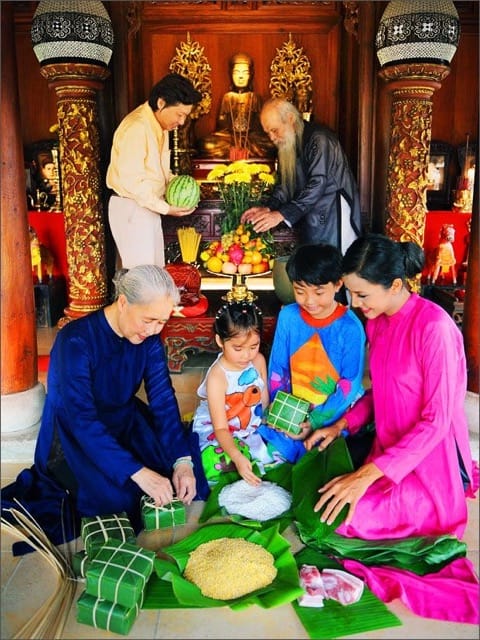
Traditional Tet Preparations and Celebrations
Embarking on the journey of a traditional Tet celebration in Vietnam involves a series of meticulously curated activities, each carrying profound cultural significance.
Preparing for Tet:
- Shopping Excursion: Families immerse themselves in the lively hustle and bustle of markets, procuring essentials for Tet festivities.
- Housecleaning Ritual: A thorough cleansing of homes signifies bidding farewell to the old year and welcoming the new with a fresh start.
- Banh Chung Crafting: The art of wrapping banh chung, a traditional rice cake, becomes a communal affair, symbolizing unity and prosperity.
- Fruit Tray Presentation: Meticulously arranged fruit trays are prepared, each element carrying symbolic meaning for a bountiful year ahead.
- The ceremony to worship Mr. Cong, Mr. Tao: A ritual paying homage to Mr. Tao, the Kitchen God, involves offerings and prayers for a smooth transition into the New Year.
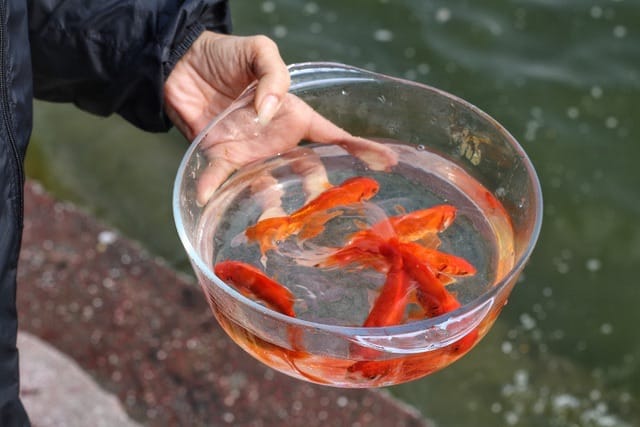
Releasing Fish to Take Mr. Tao to Heaven – Source: Collected - New Year’s Eve Offerings: Ancestral altars are adorned with offerings, connecting generations past and present.
- New Year’s Eve Celebration: Families gather for a joyous celebration, marking the culmination of preparations and the beginning of Tet.
Annual Traditional Activities During Tet:
- First Foot: Symbolizing new beginnings, communities engage in ceremonial activities like breaking ground at the start of the year.
- Temple Visits: Families flock to temples, expressing gratitude for the past year and seeking blessings for the one ahead.
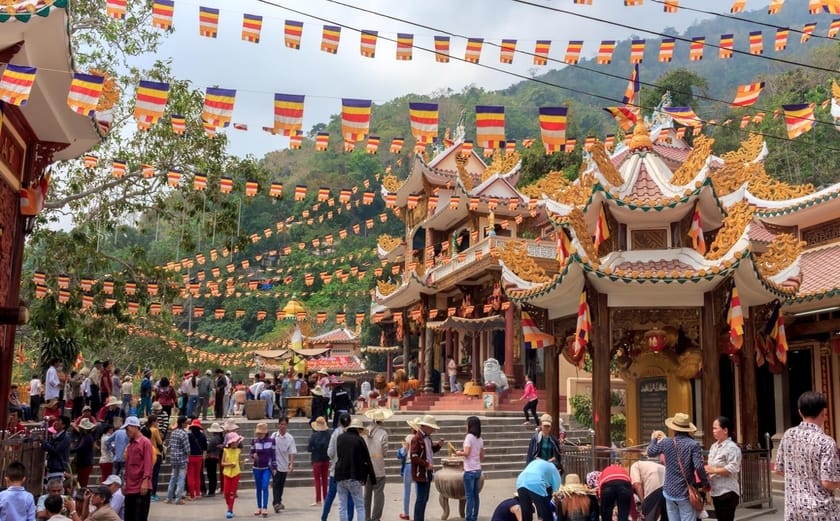
Temple Visit – Source: Collected - New Year Wishes: Heartfelt exchanges of good wishes permeate the air as individuals extend New Year greetings to friends, family, and neighbors.
- Lucky Money Tradition: The tradition of exchanging lucky money at the beginning of the year is a gesture symbolizing good fortune and prosperity.
Don’t miss your chance to enjoy Hanoi ambiance in autumn season in Vietnam.
Overview of Tet as a Cultural Integration Opportunity
Tet, extending beyond its role as a festival, offers a grand cultural immersion. For the Vietnamese, Tet is both familiar and sacred—an annual cultural activity intertwined with life’s milestones, from birth to adulthood. It serves as a window closing the old year and welcoming the new one with a mix of excitement, nostalgia, and anticipation. The festive atmosphere during Tet is enchanting, with the entire country joining in the joyous celebrations. From lively markets to colorful parades, every corner of Vietnam comes alive.
Tet hosts numerous cultural activities, providing a deeper insight into Vietnamese traditions. While regional variations exist based on beliefs, religions, and customs, Tet customs are generally divided into three periods: New Year’s Eve, New Year’s Day, and the following days. From traditional music and dance to folk games and rituals, Tet serves as an expression of the nation’s rich cultural and artistic heritage.
The Meaning of Traditional Customs and Traditions
Tet customs carry profound meanings, rooted deeply in Vietnamese history and philosophy. The meticulous preparation of traditional dishes, for example, symbolizes abundance and prosperity for the upcoming year.
Family stands at the core of Tet celebrations. It symbolizes reunion, drawing those working far away back to their hometowns for joyous family reunions. Tet emphasizes the values of solidarity, love, and filial piety, while the exchange of gifts strengthens social bonds, fostering a sense of community.
Winter in Vietnam is a beautiful and magical time to visit the Northside, but the cooler temperatures require careful preparation.
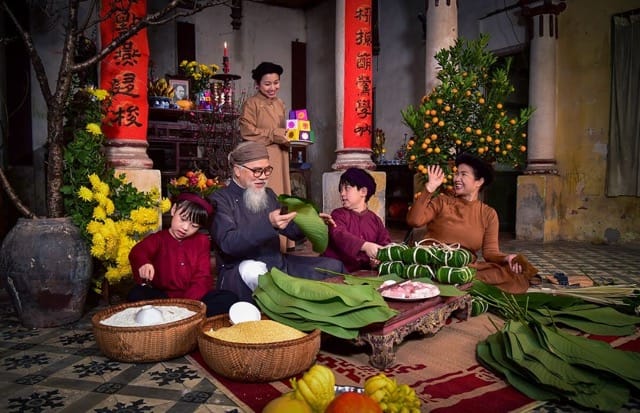
Learn about Tet Customs and Practices
Ancestor Worship and Rituals
Ancestor worship takes center stage during Tet, showcasing deep respect for elders and ancestors. Families meticulously clean their homes and decorate ancestral altars to pay homage to their predecessors.
House cleaning is not a mere physical activity but a symbolic ritual, symbolizing the removal of the old to welcome the new. This belief underscores the notion that a clean home invites luck and prosperity.
Decorating ancestral altars involves arranging offerings such as fruits, flowers, and symbolic objects. Each item holds spiritual and cultural significance, contributing to the creation of a sacred and harmonious atmosphere.
Customs Associated with Family, Greetings, and Decorations
Family reunion forms the foundation of Tet celebrations. People travel from afar to be with their loved ones during this auspicious time. The reunion dinner, also known as “New Year’s Eve,” is a momentous occasion filled with joy and warmth.
Traditional greetings exchanged during Tet convey good wishes for health, happiness, and prosperity. These greetings hold significance in their ability to create positive energy and nurture strong relationships.
Lucky decorations, including iconic red and yellow items, symbolize good luck and prosperity. For example, peach blossoms represent vitality, and kumquat trees symbolize wealth and luck.
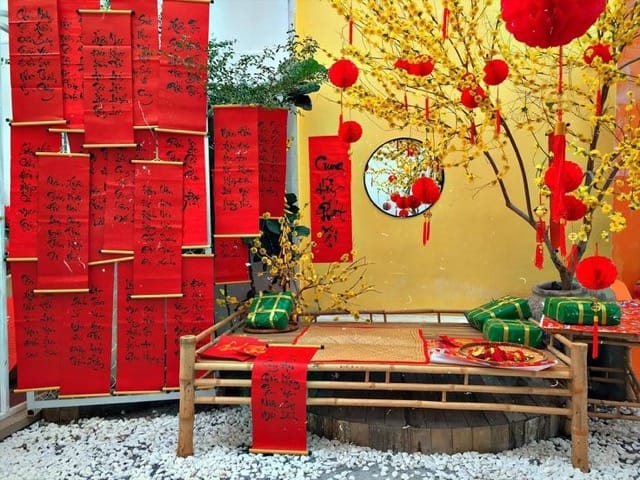
Best Time to Travel to Vietnam for Tet
Seasonal Considerations for Planning a Trip during Tet
Tet, the Vietnamese Spring Celebration, spans late January to mid-February, following the lunar calendar. Knowing these dates is essential for aligning your trip with Tet festivities.
Weather conditions vary; the north experiences cooler temperatures, while the south is warmer. Checking local forecasts ensures a comfortable experience.
For an immersive Tet experience, explore Hanoi’s Old Quarter, alive with performances and vibrant markets. Ho Chi Minh City dazzles with lively fireworks. Hoi An and Hue blend cultural heritage with Tet festivities.
Overview of Key Events, Festivals, and Activities during Tet
- Fireworks Displays: Spectacular shows illuminate Ho Chi Minh City’s skyline, creating a breathtaking spectacle.
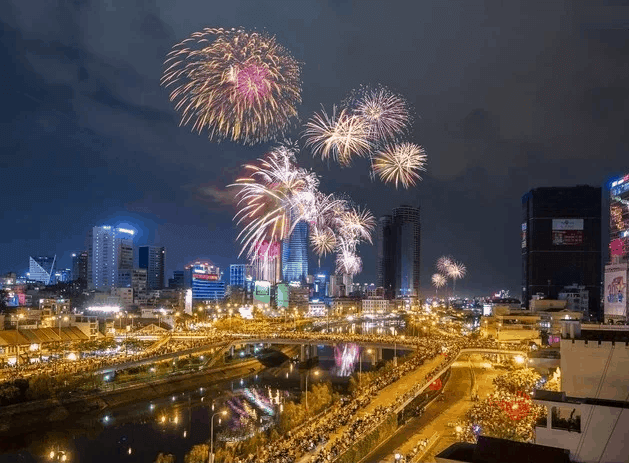
Firework Display in Ho Chi Minh City – Source: Collected - Tet Markets: Explore bustling markets like Ben Thanh in Ho Chi Minh City and Dong Xuan in Hanoi, where locals and tourists partake in the festive shopping atmosphere.
Activities, Performances, and Cultural Showcases:
Making Sticky Rice Cake: Engage in crafting square (bánh chưng), round (bánh giầy), or cylinder (bánh tét) sticky rice cakes.
Dragon and Lion Dances: Symbolic performances in various locations enhance the festive ambiance.
Meetings and Greetings, Lucky Money: Experience the tradition of giving and receiving lucky money, a symbol of good fortune and blessings.
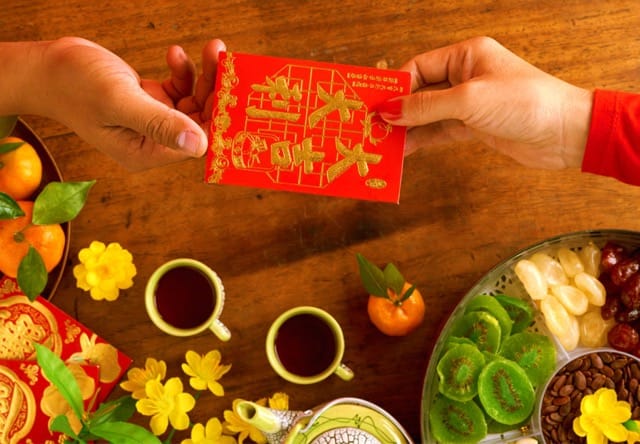
Unique Dishes Associated with Vietnamese Spring Festivals
During Tet, families across Vietnam prepare traditional dishes, each carrying symbolic meanings for a prosperous new year. Banh chung and banh tet, staples on every Tet table, symbolize abundance and prosperity. The familiar braised meat dish, featuring square pieces of meat and round eggs, embodies harmony and balance for the year ahead.
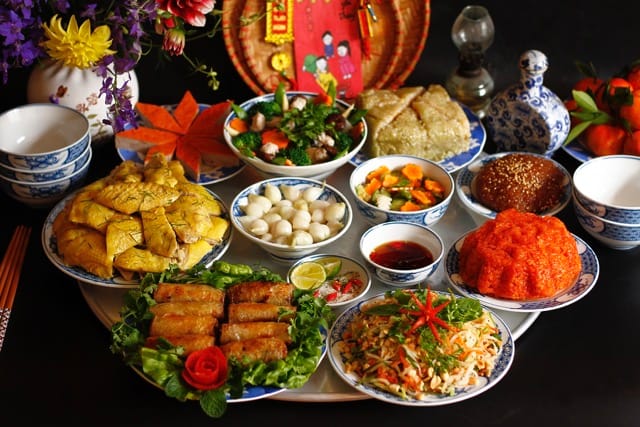
The Role of Cuisine during Tet: Tet is inseparable from food, symbolizing prosperity, luck, and family unity. Families meticulously craft a feast, emphasizing the importance of shared meals during this festive period.
Traditional Tet dishes hold cultural significance; for instance, boiled chicken is often placed on ancestral altars, signifying respect for ancestors. Understanding these customs enriches the cultural experience of Tet.
Visiting spring season in Vietnam to discover the tradition New Year Eve.
Schedule of Events during Vietnamese Spring Celebration
Overview of Tet Event Calendar
The Vietnamese Spring Celebration, Tet, brings forth a vibrant schedule of events spanning late January to mid-February. Delve into a comprehensive calendar featuring major events like parades, fireworks displays, temple visits, and various cultural festivities throughout the Tet period.
Ensure you don’t miss the pulse of Tet by marking key dates, allowing you to immerse yourself in the rich tapestry of celebrations that define this auspicious time.
Highlights of Parades, Fireworks, and Cultural Performances
Experience the grandeur of Tet parades, where vibrant processions weave through streets, showcasing traditional costumes, music, and dance. Fireworks displays illuminate the night sky, creating a breathtaking spectacle.
Specific locations such as Ho Chi Minh City and Hanoi become focal points for these events. Explore iconic venues like Nguyen Hue Walking Street or Hoan Kiem Lake for an unforgettable display of Tet festivities.
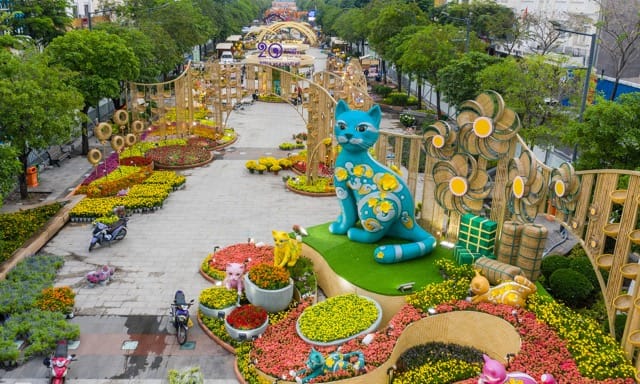
Engage with the local community by participating in Tet celebrations. Connect with the vibrant atmosphere at flower markets, where locals gather to buy blossoms for their homes. Witness traditional performances featuring music, dance, and other cultural expressions.
Joining community events such as traditional games or communal meals offers a deeper understanding of the Tet spirit. Embrace the warmth of local hospitality as you become an active participant in these joyous occasions.
Conclusion
In summary, Tet, the Vietnamese Spring Celebration, stands as the pinnacle of cultural significance in Vietnam. Its importance transcends time, weaving together history, tradition, and community. As travelers, embracing Tet becomes an invitation to dive into the heart of Vietnamese culture. Beyond a festival, Tet represents a unique opportunity to witness and partake in vibrant traditions, forging a deep connection with the rich tapestry of Vietnamese heritage. Immerse yourself in Tet during your travels, and let the cultural richness unfold.
Frequently Asked Questions (FAQ)
A. What is the Festival in Vietnam in Spring?
Explanation of the Spring Festival in Vietnam
a. The Spring Festival in Vietnam, often referred to interchangeably with Tet, is a cultural extravaganza marking the onset of spring and the Lunar New Year. Tet encapsulates a series of festivities, with the Spring Festival being a key element. Both terms are used synonymously to denote this joyous time.
b. The historical and cultural roots of the Spring Festival run deep in Vietnam. Originating from ancient agrarian practices tied to the lunar calendar, it symbolizes the cyclical nature of life and the renewal of the earth. The Spring Festival’s significance lies in its embodiment of cultural heritage and the collective spirit of anticipation for the new year.
Connection between the Festival and Tet
a. The Spring Festival is the cornerstone of Tet celebrations, playing a pivotal role in ushering in the new year. Its significance is manifested in various customs and activities woven into the fabric of Tet celebrations. These include the meticulous preparation of homes, the creation of symbolic foods, and the observance of traditional rituals.
b. Highlighting the various activities associated with the Spring Festival during Tet, families engage in practices such as cleaning their homes to sweep away the old and welcome the new. Traditional foods like banh chung hold cultural symbolism, emphasizing unity and prosperity. The Spring Festival, intertwined with Tet, encapsulates a spectrum of customs that define Vietnamese New Year celebrations.
B. What Happens during Tet in Vietnam?
Detailed Description of Activities and Customs during Tet
a. Tet unfolds as a tapestry of diverse activities and customs. Family reunions take center stage, emphasizing the importance of kinship. Temple visits provide a spiritual dimension, symbolizing respect for ancestors. The skies come alive with fireworks, and cultural performances showcase the rich artistic heritage of Vietnam.
b. Comprehensive coverage extends to family rituals, where offerings on ancestral altars carry deep cultural meaning. The exchange of well-wishes and the giving of lucky money are common practices during Tet. The festivities encapsulate a broad spectrum of customs, creating a mosaic of cultural expressions.
Insights into the Atmosphere and Spirit of Tet Celebrations
a. The festive atmosphere during Tet saturates Vietnam with joy and vibrant energy. Streets are adorned with decorations, markets bustle with activity, and the air resonates with the sound of laughter and celebration.
b. Tet embodies a spirit of joy, renewal, and unity. As families and communities come together, there is a collective sense of optimism and anticipation for the possibilities of the coming year. The celebrations create an atmosphere where the past is honored, the present is cherished, and the future is embraced with hope.


Related Posts
Saigon’s “Flower Market Replica”: Where To Find Them
Ho Chi Minh City’s floral charm is not limited to its bustling wholesale markets. Imagine wandering through a place where vibrant petals, fragrant blooms, and the spirit of traditional Vietnamese markets come alive—without the overwhelming crowds. A flower market replica captures that magic, blending the beauty of fresh flowers with the charm of a curated, […]
Is it Safe to Travel to Vietnam Right Now? A Complete 2025 Guide
Vietnam has emerged as one of Southeast Asia’s most captivating destinations, drawing millions of visitors annually with its rich culture, stunning landscapes, and incredible cuisine. However, many travelers still ask: Is it safe to travel to Vietnam right now? This comprehensive guide provides you with everything you need to know about Vietnam travel safety in […]
Ho Chi Minh Cu Chi Tunnels Tour: The Ultimate Guide
The Cu Chi Tunnels stand as one of Vietnam’s most remarkable historical sites, offering visitors a profound glimpse into the ingenuity and resilience displayed during the Vietnam War. For travelers, a Ho Chi Minh Cu Chi tunnels tour represents an essential experience that combines education, adventure, and deep cultural understanding. This comprehensive guide will help […]